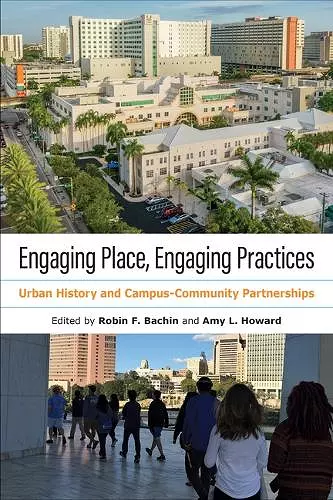Engaging Place, Engaging Practices
Urban History and Campus-Community Partnerships
Robin F Bachin editor Amy L Howard editor
Format:Hardback
Publisher:Temple University Press,U.S.
Published:2nd Dec '22
Currently unavailable, and unfortunately no date known when it will be back

Colleges and universities in urban centers have often leveraged their locales to appeal to students while also taking a more active role in addressing local challenges. They embrace civic engagement, support service-learning, tailor courses to local needs, and even provide university-community collaborations such as lab schools and innovation hubs. Engaging Place, Engaging Practices highlights the significant role the academy, in general, and urban history, in particular, can play in fostering these critical connections.
The editors and contributors to this volume address topics ranging from historical injustices and affordable housing and land use to climate change planning and the emergence of digital humanities. These case studies reveal the intricate components of a city’s history and how they provide context and promote a sense of cultural belonging.
This timely book appreciates and emphasizes the critical role universities must play as intentional—and humble—partners in addressing the past, present, and future challenges facing cities through democratic community engagement.
“Through a collection of compelling scholarship, Bachin and Howard have shown the importance of universities for correcting discrimination and its legacies. Consider this book more than a compendium of inventive campus-community partnerships; it’s an indispensable guide for the future of urban justice.”—N.D.B. Connolly, Herbert Baxter Adams Associate Professor of History at Johns Hopkins University, and author of A World More Concrete: Real Estate and the Remaking of Jim Crow South Florida
“Robin Bachin and Amy Howard have compiled a powerful case for publicly engaged scholarship not only as a vitally important modus operandi for urban historians but also for universities writ large. The composite picture they have pieced together from public history case studies drawn from cities across the nation compellingly illustrates how the ‘lens of the past’ provides a foundation for reciprocal engagement between universities and their communities. Engaging Place, Engaging Practices vividly demonstrates the value of urban universities collaborating with local partners to heal historical wounds, co-create knowledge of who we are today, and put our universities and communities jointly on a path to racial equity and justice.”—Nancy Cantor, Chancellor and Distinguished Professor at Rutgers University–Newark, and coeditor of Our Compelling Interests: The Value of Diversity for Democracy and a Prosperous Society
"A real strength of this collection is the range of university–community partnerships highlighted.... Engaging Place, Engaging Practices is an excellent addition to the literature on public history, public humanities, and university–community partnerships. The range of projects included in the book make it an appealing read for anyone already doing university–community partnership work and for those who want to join in it.... [T]he volume is convincing in its call for historians and the broader university to truly partner with surrounding communities in order to collectively analyze and engage in pressing social, economic, and environmental problems." —Teachers College Record
"In nearly all the chapters, the authors demonstrate that sustained collaboration and committed university leadership are essential to ensure that the potential and power of urban universities can be leveraged to promote positive change.... [C]hapters demonstrate how instructors and individual courses can make a difference in the lives of students and residents. As such, the collection provides examples at a variety of scales—from the block, neighborhood, city, and regional school-of '...colleges and universities [striving] to matter'. In doing so, the editors make the case that the engaged university can and should do more to shape 'inclusive, equitable, and sustainable' communities—and that universities need to assume a heightened leadership role in a post-COVID-19 world."—Economic Development Quarterly
ISBN: 9781439920961
Dimensions: unknown
Weight: unknown
215 pages